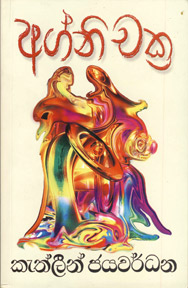 Agni Chakra Agni Chakra
(Circles of Fire)
(Chapter 21)
By Kathleen Jayawardene
Translated by Ranga Chandrarathne and Edited
by Indeewara Thilakarathne
Why should Amritha give me an extract of a letter Karl Marx sent to
his daughter Lora? Does she know the Leftist political organisation that
I represented sometime ago? By now, this political organisation has no
clout. Though she would have heard about a political organisation which
is almost non-existent, she could not have known it as Kalinga and I was
active in the organisation about twenty years ago. It was questionable
whether she had even been born by then.
Amritha showed me an extract of a letter dated March 12, 1866 which
Marx sent to his daughter. Her ulterior motive became clear to me only
when I read the extract. I considered her interest in opening up new
avenues for me as an indication that she liked me. On the other hand I
knew that she wanted to instil in me her deep devotion and admiration of
the doctrine of the Buddha. Though Shantha had the same urge at a
certain stage, it had been gradually waning off.
Amritha had found the Marx's extract from a collection of letters
translated into Sinhala by Ven. Mandawala Pagnavansa thera. The letter
was in a booklet entitled 'Nobuduwo Bodun Dakithi' (Non Buddhists see
the Buddha).
"Most of my time I'm walking and breathing fresh air. I read nothing
and write less. I go to bed at 9.00 p.m. Generally, I subside into the
emotional state of non-existence that Buddhism considers to be the
height of human delicacy".
I thought if Shantha had found the above extract, she would also have
read it before me.
I thought whether I can consider Amritha and Shantha as two fruits in
the same branch.
Subtle differences are there between the two fruits in the same
branch or two lemons in one stalk. They are only visible to a keen
observer.
Sometimes I doubted whether Amritha represented ' Jatika Chintanaya'
. It was because I vehemently opposed it. Sometimes, Shantha spoke of
Jathika Chintanaya and Sinhaleseness. But there was an attitudinal
difference between them. I thought that it can be divided as traditional
thinking and instantaneous thinking. But can thinking be instantaneous ?
Is the thinking based on matter? Often Shantha comes with ideas and
views borrowed from her mother, elders or from the tradition.
Apparently, Amritha has no such tradition.
Once she told me that her mother died when she was a three months
old. Which factors led to her developing strong feelings for country,
nation and religion?
"Amritha, I heard that you every day light a lamp for the Buddha", I
said one day smiling. I said so as Shantha was engaged in religious
activities at the appointed time and not knowing that Amritha was engage
in such activities.
 "Yes, Sir , but not everyday", Amritha said. "Yes, Sir , but not everyday", Amritha said.
"That means..."
"There are days I fail to light the lamp for the Buddha".
"Is it ok by you?"
"What's wrong with it..? "
"If you light a lamp, you should light it everyday at the same time,
shouldn't you? "
"That's for a deity. But, Sir, Buddha is not a divinity".
I was confused and I wanted to ask why she should light the lamp.
"Then, why, do you light the lamp for the Buddha?"
"I do it knowing well that Buddha has no use of the lamp or the glass
of water I offer", she said attentively.
"If the Buddha was alive, then, at least, the glass of water would be
useful. What I mean by worshiping the Buddha is to have an interaction
with myself. Why should I have an appointed time for it|?"
I was confused sensing the subtle difference between Amritha and
Shantha.
"What are the profits and losses in this transaction?"
"I can think twice about errors that I might commit ", she said
thoughtfully.
"Errors? What you called errors is experiencing life itself? "
"What I mean by errors are those from which I have to suffer now or
later", Amritha said.
" The suffering caused by those experiences"
"Amritha, you have not yet enjoyed life?"
Looking into my eyes, turned away and said "Sir, why not". I was
shocked. What caused my shock and surprise is what I was yearning for
such a long time.
"I never knew it!"
"That's an old incident which happened during my O/Ls", she laughed
heartily.
"He was a married man...Those days I thought I loved him a lot. But
now I know that was not love!"
"How did you come to that realisation?"
"Sir, if that was love, it could not have been waning off in this
manner..."
"Then..?"
" I was a bit happy because of him; but suffered a lot ; had to
pocket out insults ...later I came to terms with it"
"But...isn't that what you call life? Is it humane to destroy the
momentary pleasure because of consequences? "
"Sir, wasn't it too long time to suffer for a momentary pleasure! "
I felt like having an electric shock with a kind of awakening and
pressure. The question "wasn't it too long to suffer for a momentary
pleasure?" echoed in me. I looked at Amritha with surprise.
Are the roots of her incredible willpower in the Sinhalese -Buddhist
thinking?
But did all the women who surrounded me have the Sinhalese-Buddhist
hide?
Why should I think so much about these problems?
It is said that the Buddha taught that you should not search for
roots in any thing. Is it only those men who would be tired off by
searching origins? I thought, however, that it was me who had been more
confused than Amritha or Shantha. What caused this? I, once again, tried
to identify subtle features in Amritha's and Shantha's characters.
If Amritha is good it is not because of any external moral guidance.
She refrains from immoral engagements as she does not want to face their
adverse consequences. It's an avoidance of pressure.
But Shantha is good not because of such experiences. The chamber of
tradition she is imprisoned in has been her own creation.
At early stages, I tried to convince Shantha of the futility of her
attempts to hide sexuality in a bottom of an unfathomable pit. I often
hinted her that a woman who denounced sexuality would inherit an unhappy
married life. Those hints were given because of her understanding in
philosophical.
One day I gave Shantha a brief Sinhalese translation of a passage on
sexuality in the Su Nu Ching ,a book in Taoism of Lao-tzu who lived in
the sixth Century BC in China. "All that which would make man impotent
is caused by wrong love making" stated the book. Through so many
incidents, I have hinted her why people don't like women who do not
respond to sex.
Once I showed her an album of photographs depicting statues in the
temple of Khajuraho in India featuring different postures of love
making.
That was because I knew she had a devotion to gods. I asked her with
a smile why the outer walls of the sacred temple had been desecrated
with dirt. I also offered her an explanation found in a book.
The book described the insightful vision of the artists who built
this temple. It was said that passion and sexuality is only a
superficial condition. It further says that those statues symoblised
that those who have been prisoners of sex without enjoying
sex, could not enter the temple or the sacred area. That those who
enter the temple could see no statues of gods but emptiness and that it
implies it is only a person who enjoyed life can only enter into self, I
stressed Shantha.
Totally disregarding my main objectives, Shantha said that those
images were made to satisfy the god 'Indra'. Since different postures of
the statues reminded one a foreplay between Shiva and the power, the god
'Indra' was jubilant and caused rains, she said nullifying my
objectives.
I really did not know why Shantha had not seen the nexus between
spirituality and sexuality even in her youth. Why the Shiva in Hindu
trinity though depicted in the form an ascetic, is symoblised by ' male
sex'? Has Shantha ever thought of it? It is therefore, that I was
reminded of Freud's new model of human mind. It is the concept of Id and
Ego. Has Shantha faced this situation? Has she considered me a womaniser
because of this? Can the union between 'man' and 'woman' be interpreted
as sexual misbehaviour? I was not engaged in misbehaviour.
I can remember that Bible says "If you look at a woman with lustful
eyes, it amounts to committing adultery". If it is so, is there a single
a saint who does not fall into this category?
I know that the manifestation of sexual energy is a form of
possession by devils. I have seen uncountable times my mother getting
into trances. Can't I do a research paper on psychology about mother's
wild dances brandishing a burning torch? But have I got such a clear
mind? On the other hand, would it be a self-destructive act?
It was a German, a doctor D. Pierre who researched on devil
possession. In his book, a case of nuns Possessed by devils showed the
same kind of shiver.
However, Amritha's view that 'Freud was more concerned about
sexuality' is similar to the views of Karl Jung who gave a new dimension
to psychoanalysis. Karl Jung saw the child's attraction to mother's
breasts as a natural instinct towards nutrition.
On the other hand, I don't know whether Amritha represents Freud's or
Jung's ideas. She who refuses all 'isms' transacts with her own soul.
The half-baked and unripe nature in most university students is
manifested in Amrita as in over ripe and rotten nature.
I thought that if I married Amritha what would have been the changes
that would have occurred in my life. It is true that Shantha had tried
to brighten my life after the marriage.
But...?
If Shantha had spread fragrance in the night like a flower of Kumudu
which blossoms in every night , Amritha would have been a freakishly
bloomed lotus in the night?
Footnote
Jathika Chintanaya- School of thought which is said to be the
indigenous thinking.
Kumudu- A nocturnal white flower.
|

